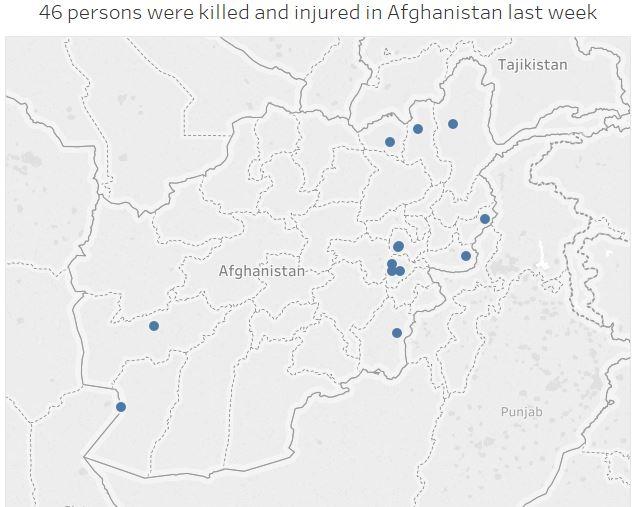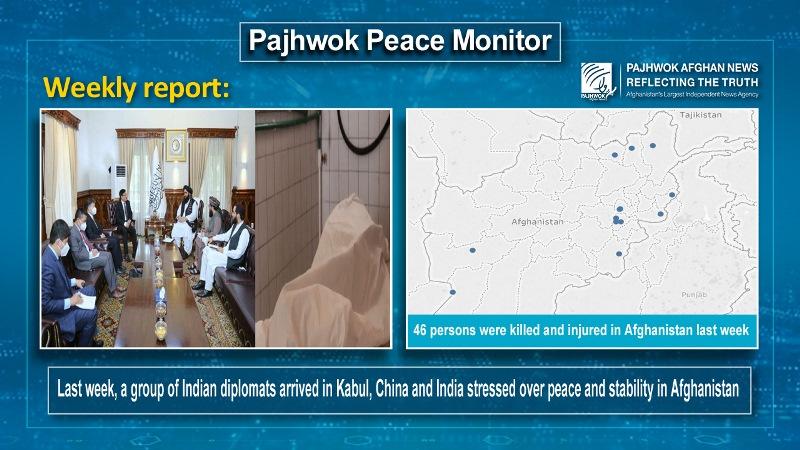KABUL (Pajhwok): Last week, a group of Indian diplomats arrived in Kabul, China and India stressed peace and stability in Afghanistan, tens of global economic experts demanded unfreezing of Afghanistan’s reserves while Ashraf Ghani claimed he was still president.
Last week’s major events
- A batch of Indian diplomats arrives in Kabul and stations in its embassy
- China and India say they will continue talks on peace and stability in Afghanistan
- Time to boost economic ties with Iran: FM Muttaqi
- Seventy-one global economic experts ask US to unfreeze Afghan assets
- I am still Afghanistan’s constitutional president: Ashraf Ghani
- Protest rallies in six provinces condemn US airstrike in Kabul
- Pakistan involved in banning girls schools in Afghanistan: Hamid Karzai
- The issue of girls schools has a religious aspect and requires ulema’s consensus
- Last week, 15 people were killed and 31 others injured in Afghanistan
Casualties:
Last week, 15 people were killed and 31 others injured in Afghanistan.
Two people were killed and 22 others injured in a bomb blast in the Pul-i-Sokhta area of capital Kabul.
A religious scholar was killed in a blast inside his seminary in Kabul.
Unidentified gunmen killed a tribal elder in Nangarhar, while three people, including a woman, were killed in Logar.
In Farah, a young man killed his friend, one body was recovered in Nimroz and another was recovered from the Kokcha River in Takhar province.
Some officials said a robber was killed by security forces in Kunduz province, two security personnel and three civilians were injured in a roadside blast in Badakhshan while four children were injured in a blast from unexploded ordinance in Logar.
Some Pakistani and international media reported that Tehreek-i-Taliban Pakistan (TTP) leader Umar Khalid Khorasani and his two commanders were killed in a roadside blast in Paktika province but the Afghan government did not comment on this development.
There is the possibility that reports about some events might not be received or sources did not reveal the exact number of casualties.

The previous week, 25 people were killed and 32 others were injured
Last week, a group of Indian diplomats arrived in Kabul, China and India stressed peace and stability in Afghanistan, tens of global economic experts demanded unfreezing of Afghanistan’s reserves while Ashraf Ghani claimed he was still president.
Before the regime change in the country last year, hundreds of people would get killed and injured in Afghanistan every week.
Interaction with Afghan government:
Indian Foreign Minister S. Jaishankar reportedly said that a group of Indian diplomats, without the ambassador, went to the country’s embassy in Kabul.
“We have decided to send back diplomats to the embassy, but the ambassador will not go. We will make sure that they will cooperate in humanitarian and medical aid, vaccination and development projects.”
According to reports Chinese Special Reprehensive for Afghanistan Yue Xiaoyong held talks with Indian officials on the recent situation in Afghanistan and both sides agreed to continue these talks.
Xiaoyong also held talks with Afghan officials and said the acting Afghan government had carried out important tasks in a short time.
Last week, 15 prisoners released in the UAE arrived in Kabul. Acting Foreign Minister Amir Khan Muttaqi during a meeting with Iranian Special Representative Hassan KazamiQumi said that it was time for Afghanistan and Iran to boost economic ties.
A high level Afghan delegation is expected to travel to Iran for talks with Iranian officials on key issues.
Call for release of frozen Afghan assets:
Last week, more than 70 economists and experts from US, Germany, Britain and India, including Nobel Laureate Joseph Stiglitz, called for Washington and other nations to release Afghanistan’s central bank assets in a letter sent to US President Joe Biden on Wednesday.
The UN Office of the Coordination of Humanitarian Affairs (UNOCHA) said the people of Afghanistan continued to be in dire need of international assistance despite an ongoing humanitarian response of unprecedented scale and nature. It said currently around 25 million Afghan are facing starvation.
Ashraf Ghani: “Doha agreement was a tragedy”:
Last week, former Afghanistan President Ashraf Ghani in an interview with the Afghanistan Broadcasting Network on Wednesday evening, characterized the Doha Agreement as a tragedy.
Ghani claims he is still Afghanistan’s ruler under the country’s constitution.
The ex-president went on to criticize the peace process spearheaded by the erstwhile US special envoy Zulmay Khalilzad and called it a tragedy.
Condemnation of US airstrike:
The week before last week, US President Joe Biden announced that Al Qaeda leader Ayman al-Zawahiri was killed in an American drone strike in Afghanistan’s capital. The Islamic Emirate issued a statement, saying they had no information about the entry and presence of Zawahiri in Kabul.
Following the airstrike, people and moneychangers in Panjsher, Bamyan, Faryab, Kandahar, Helmand and Zabul provinces carried out protests and denounced the attack and called it against international principles. Such protests also erupted in other provinces as well.
Hezb-i-Islami leader Gulbadin Hekmatyar, referring to the killing of Al-Qaeda chief Ayman Al-Zawahiri in Kabul, said: “Sunday’s attack was not only an attempt to kill Zawahiri; it was also an assault on the entire Afghan nation, its independence and sovereignty. All Afghans condemn it. It was a terrorist attack that cannot be justified in any way.”
The HIA leader claimed the Biden administration did not have any proof of killing Zawahiri.
Different remarks on girls’ schooling
Last week, Former President Hamid Karzai in an interview with SPIEGEL claimed that the Taliban’s policy to bar Afghan girls from attending school was made on Pakistan’s orders rather than in accordance with Islamic law.
But Zabihullah Mujahid, the government’s spokesman, said these issues had Islamic side and needed an agreement from the ulema inside the country.
Meanwhile, Acting Education Minister Noorullah Munir said that cultural restrictions were the main reason behind the closure of girls’ schools.
nh/sa/ma







GET IN TOUCH
NEWSLETTER
SUGGEST A STORY
PAJHWOK MOBILE APP